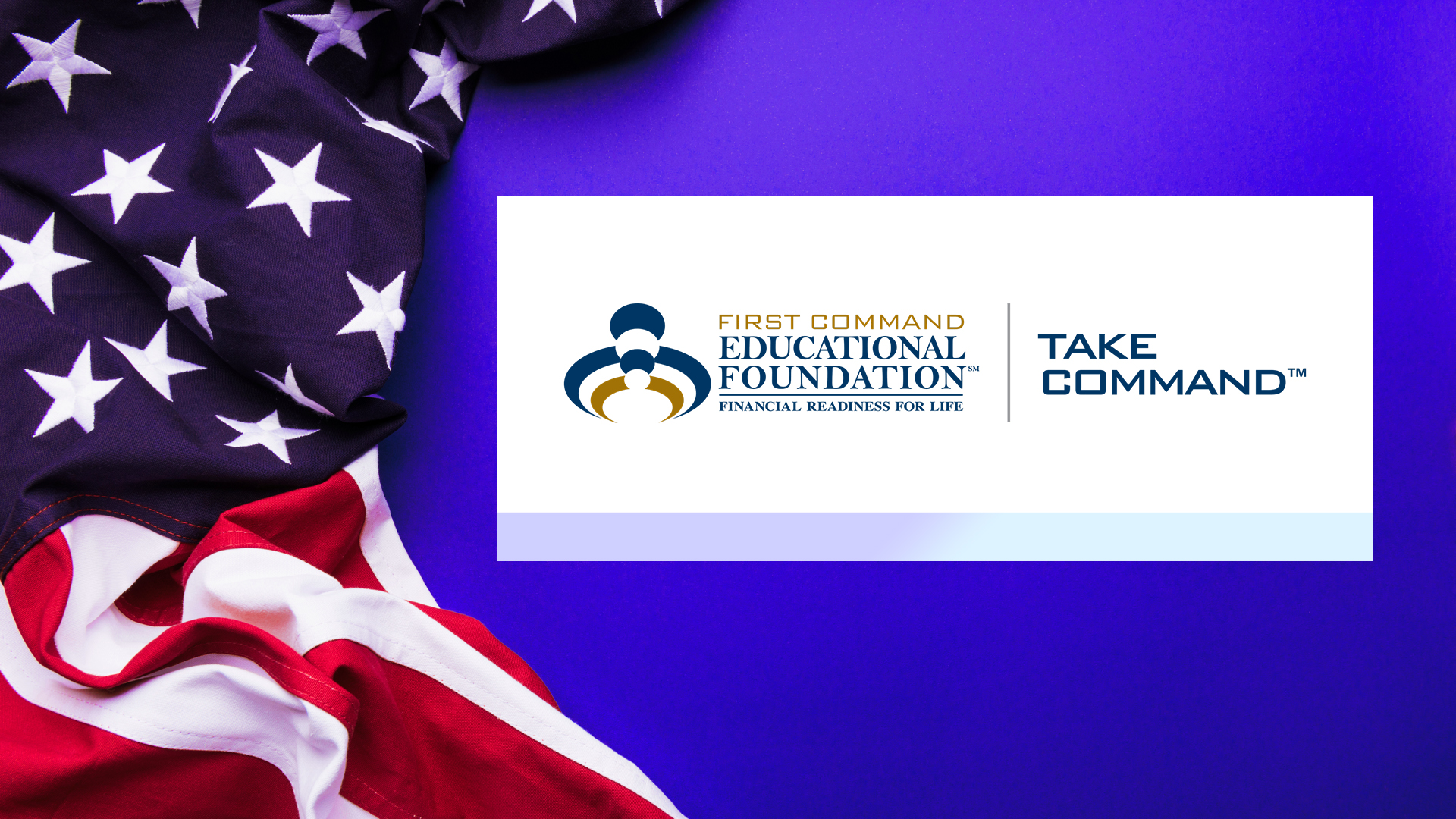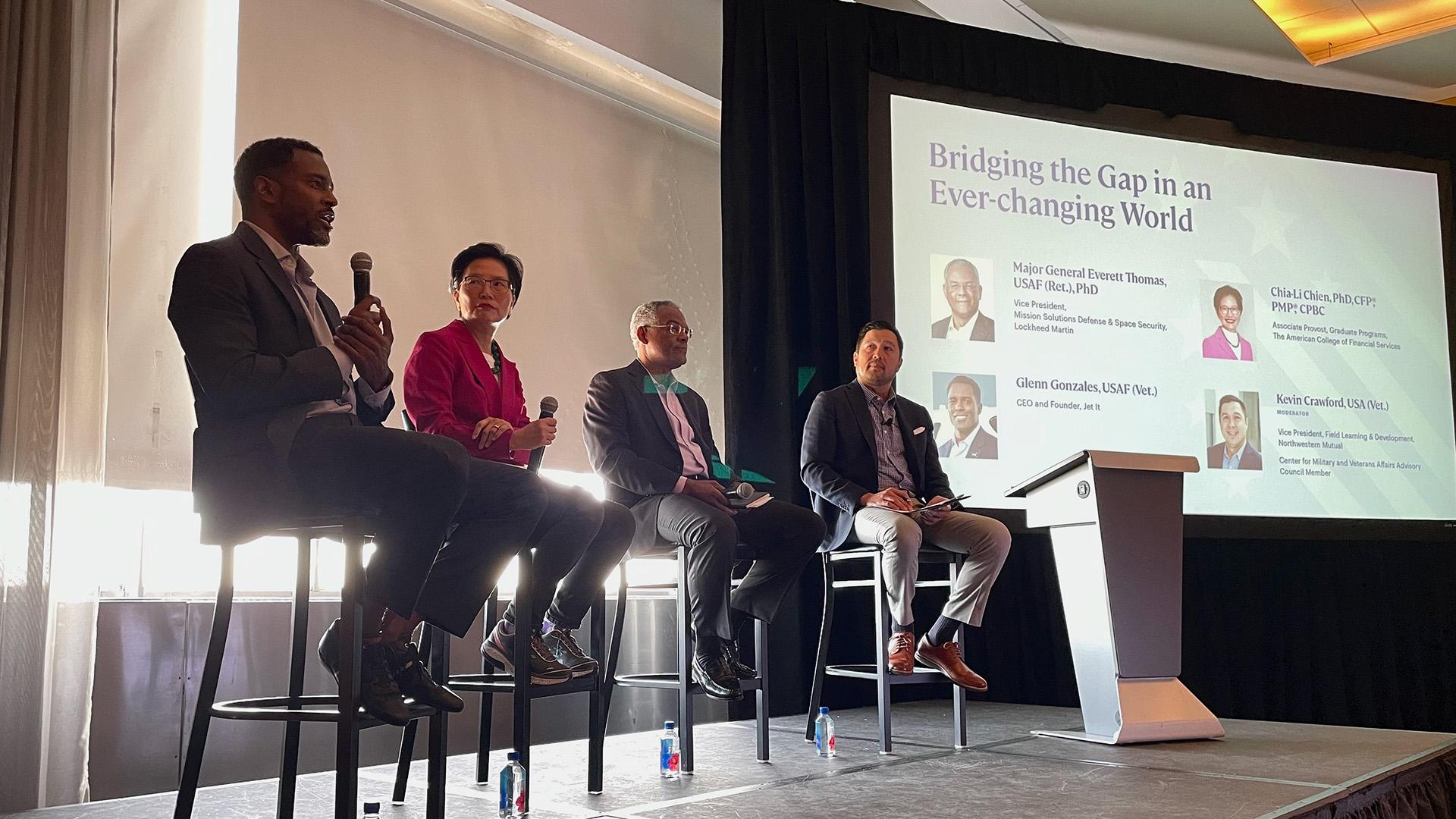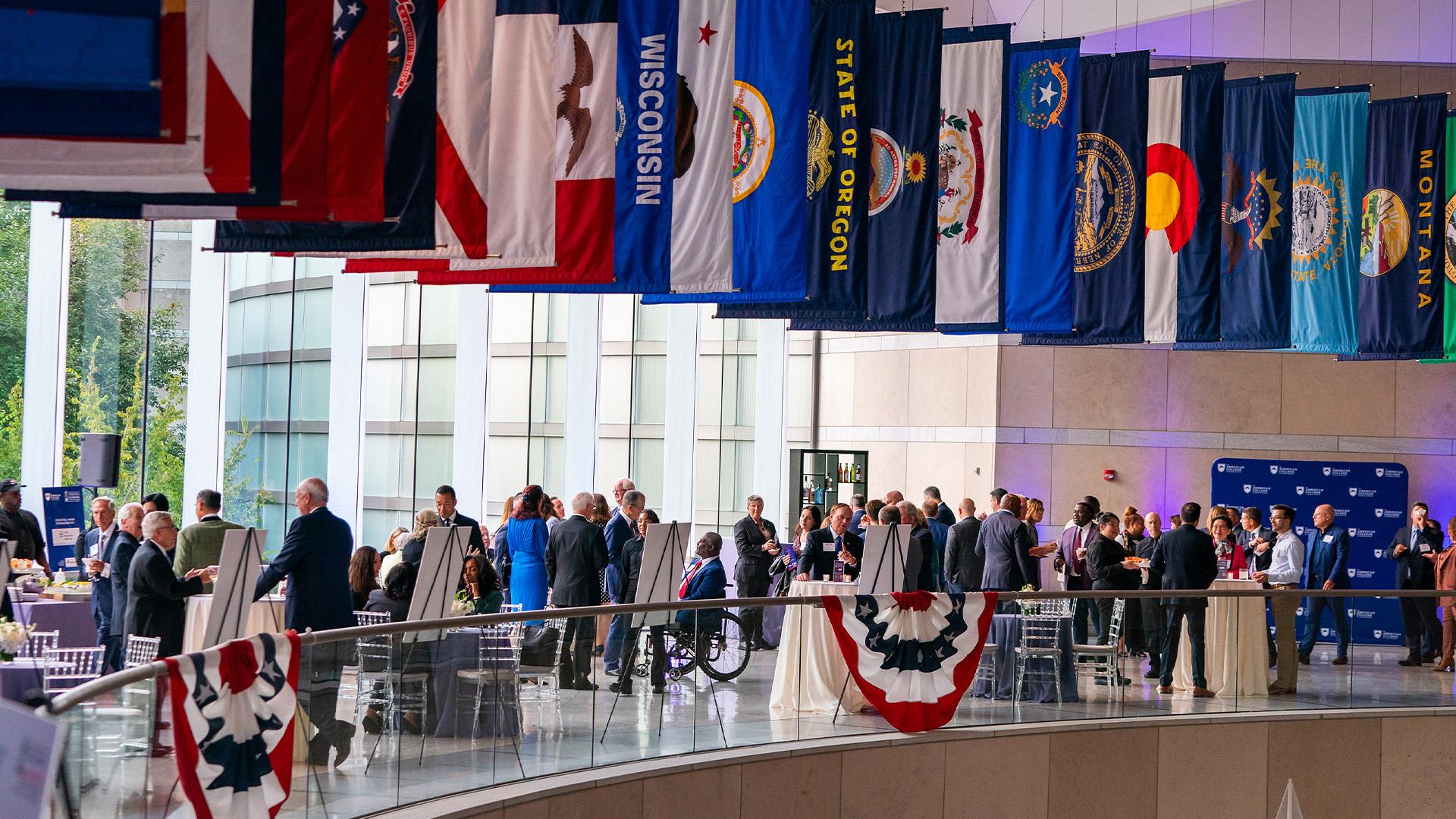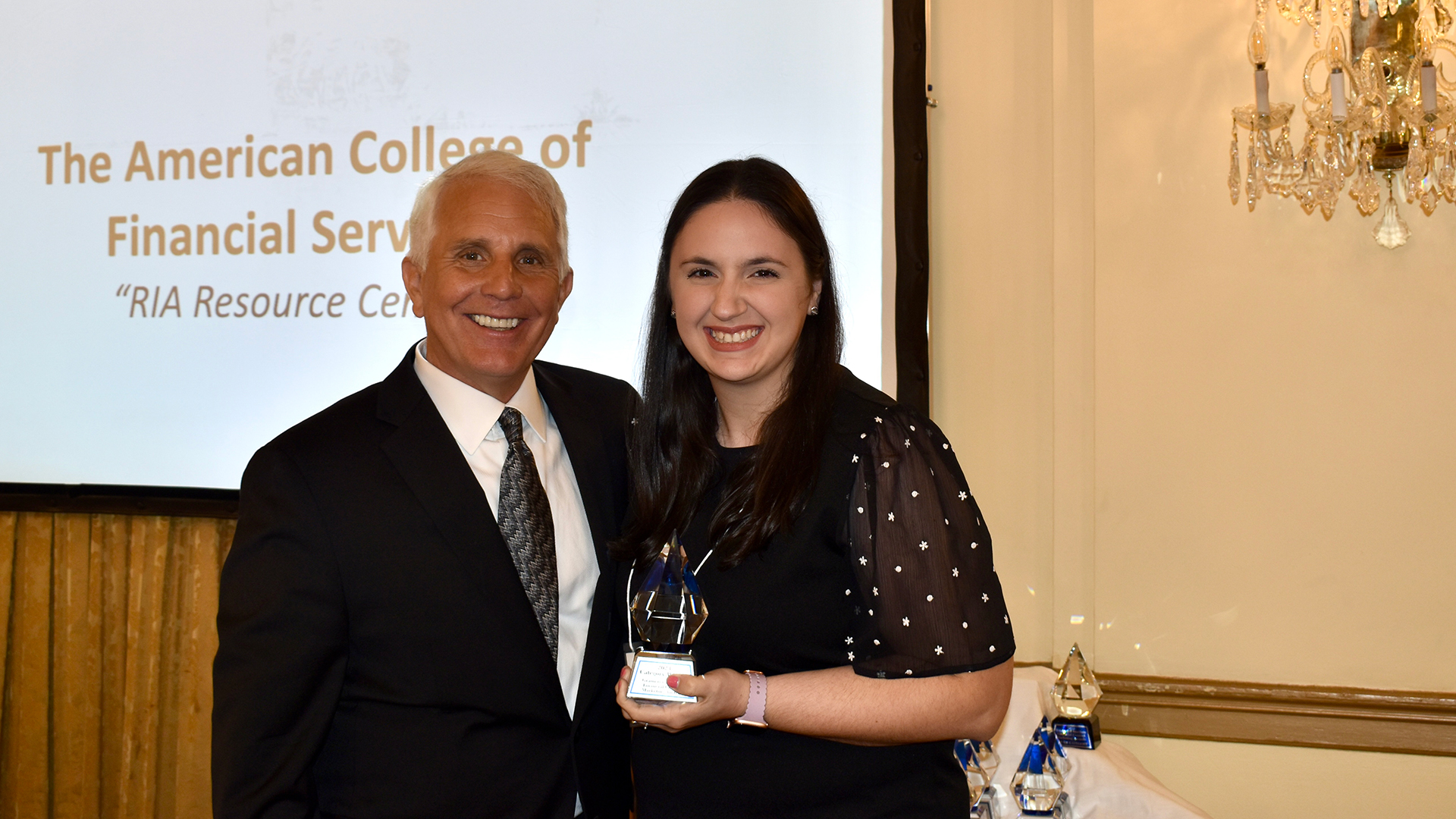Air Force Master Sergeant Expresses Gratitude for WMCP<sup>®</sup> Scholarship

I would like to say thank you and provide a few words to express my gratitude for the WMCP® scholarship.
I’m going to retire from the Air Force next year, and this is going to make my transition out of the military a lot easier. This scholarship is going to afford me the luxury of not waking up and saying, “I need to go into work today,” but waking up and saying, “I get this opportunity to go do something I enjoy today.” For almost two decades I have enjoyed talking about personal finances with those around me, and now the time has come for me to get a formal education in it and to help others meet their own goals.
Again, I’m excited for this next chapter in my life, and this scholarship has helped create this opportunity for me.
Respectfully,
MSgt Steven Ziegler
The Center Partners with Take Command and First Command Educational Foundation

Take Command is developed and delivered by First Command Educational Foundation, a non-profit group dedicated to improving the financial readiness and economic position of the men and women who protect our country and preserve our freedom.
The Take Command Program is an interactive financial education program for active duty, reserve, and cadets of any branch of the U.S. Military and their spouses or partners. Students who complete the Take Command Program will be eligible to complete a Transfer of Credit through The American College of Financial Services to receive college credit through our consumer financial education courses.
This partnership supports the mission of both First Command Educational Foundation and the American College Center for Military and Veterans Affairs. Through our work together, we aim to provide education in financial readiness and career opportunities to men, women, and their spouses who have honorably served.
Ethics In Financial Services Insights
Can You Tell the Difference Between Acceptable Networking and Wrongful Hiring Practices?

Prudential PLC’s CFO resigned earlier this year because of an investigation into a code of conduct violation. A recent WSJ article reveals that the breach was in connection with the CFO’s efforts to help the son of an insurance regulator in Hong Kong, who had approached him about a potential job opportunity.
The regulator led the Insurance Authority of Hong Kong’s oversight of Prudential PLC and other life insurance companies. She too left her job at the Insurance Authority at the termination of her contract this summer. The company has declined to comment on the case to the Journal.
Networking and doing informational interviews are the norm in business for job seekers. It’s an understandable approach to recruitment, as hiring managers would generally prefer to hire someone that comes with a known reference than one selected at random by an algorithm. But when do relationships cross the line towards nepotism and unethical favoritism?
Conflicts of interest in hiring can be a murky area of ethics for employees. Many believe that using your relationships and networks are critical to finding a good hire. LinkedIn’s top tip for how to get hired by a large company is to develop a strategy to get an internal referral. Reconnect with an old friend, they suggest, or befriend someone who works there.
Yet favoritism and conflicts of interest are among the highest incidents of observed unethical behavior in practice, according to the annual Global Business Ethics Survey (GBES). The Ethics and Compliance Initiative has been administering this research for 20 years. One of their conclusions from the 2023 results is that the observations of all types of misconduct are at an all-time high level, at 63 percent.
Two-thirds of employees around the world indicated that they’ve observed at least one instance of a violation of a company code, policy, or law. Among the top observed misconduct is favoritism among employees, and inappropriate hiring practices.
The discrepancy between the norms of hiring and these survey results may be because of the differing characterizations of conflicts of interest. A common description of a conflict is a circumstance when you or your company benefits at the expense of another person or company – e.g., the company makes money by doing a financial trade that benefits the company but not the client, who suffers a loss. Consistent with this view, when there are decisions that make everyone better off, then it’s not a conflict. Both parties are better off when that decision is made, so it’s a win-win.
An alternate view is that even when both parties benefit, there is a potential conflict of interest when one party stands to benefit and could sway the situation without full disclosure of those influences; or when there are personal relationships involved that could have skewed the decision-making in favor of a third party.
I’ve observed these divergent perspectives when teaching. One case I often use involves an employee who is responsible for hiring company vendors. He’s identified two vendors that are, on paper, equally qualified. In a casual conversation with one vendor, the employee mentions that his wife has a rare cancer and is struggling to find good care. The vendor knows a specialist at the local hospital and can get her to the top of the list for treatment.
The case is designed to heighten the emotional sensitivity of the situation, yet the key takeaway should be that the employee should remove himself from the decision-making process and let someone else lead. Students often resist that recusal is necessary because the employee can make everyone better off. By choosing the vendor who has the relationship with the hospital and helps his wife at the same time, it’s a win-win!
Managing conflicts matters not only because favoritism is unfair to others, but also because it could be an early warning signal for other issues. In 2016, JPMorgan Chase paid a $246 million penalty to settle FCPA charges relating to their referral hiring program in China. Over the seven-year period reviewed, the company retained $100 million in revenues by hiring approximately 100 interns and employees of high-level government officials. These practices seemed to have slid down the slippery slope beyond favoritism to bribery.
Being precise about the definition of a conflict of interest can help thwart potential misperceptions. Prudential PLC said the CFO’s resignation was “in light of an investigation into a code of conduct issue,” according to the WSJ, that was “flagged by Prudential [PLC’s] HR function as a potential conflict of interest.”
Ethics training should also go one step further to provide guidance on conflicts of interest. Many companies provide employees a bonus for referring their friends to the firm. This referral practice is not problematic but when embedded within a goal-oriented, high-paced business culture, employees need clarity to identify the line where banking on personal relationships is indeed a win-win.
Inspiration and Impact at the 2023 Leadership Symposium

The Leadership Symposium and its panel of keynote speakers was made up of knowledgeable leaders from various backgrounds in academics, finance, and the military. The panel included Glenn Gonzales, USAF (Vet.) CEO and Founder of Jet It, Chia-Li Chien, PhD, CFP®, PMP®, CPBC Associate Provost, Graduate Programs at The American College of Financial Services, and Major General Everett Thomas, USAF (Ret.) PhD, Vice President of Mission Solutions Defense & Space Security at Lockheed Martin. It was moderated by Kevin Crawford, USA (Vet.) Vice President of Field Learning & Development at Northwestern Mutual and Center for Military and Veterans Affairs advisory council member.
Crawford directed the panel of speakers in a thoughtful discussion on adaptation of leadership styles to workforce changes pre- and post-COVID-19. Each panel member discussed their various leadership styles, as well as how they changed their styles from in-person to online management and training. All panel members gave keen insights into how to adapt and change during times of stress and difficult economic conditions through both failures and success.
After the Leadership Symposium panel discussion, attendees were treated to a vibrant presentation from Colonel Nicole M. E. Malachowski (USAF, Ret.) as she discussed her theme of “Harnessing Headwinds: Successfully Navigating Change & Adversity."
A 2019 National Women's Hall of Fame inductee and recent Presidential appointee, Colonel Malachowski has over 21 years of experience as an officer, leader, and fighter pilot in the United States Air Force. Upon her commission into the military, she was competitively selected to fly combat aircraft and embarked on an adventure among the first group of women to fly modern fighter aircraft. She has had the honor of commanding a fighter squadron, flying as a USAF Thunderbird pilot, serving as a White House Fellow and as an advisor to the First Lady of the United States.
Malachowski kept the audience captivated through highly entertaining anecdotes of her time in the military as a female and her challenging journey to become one of the first female fighter pilots, as well as the first USAF Thunderbird pilot. She imparted impactful pearls of wisdom on overcoming adversity and self-doubt while following your dreams.
2023 Clambake and Soldier-Citizen Award Honors Service Members and Veterans

The Clambake is the signature event of the American College Center for Military and Veterans Affairs. Along with its Founding Partner and Sponsor, Penn Mutual, the Center for Military and Veterans Affairs aims to support service members, veterans, and spouses in transition to civilian employment. The annual Clambake is the centerpiece of this effort, and as always, it proved to be an evening to remember.
Honoring Our Heroes
The 2023 Clambake was held at the National Constitution Center in Philadelphia, Pennsylvania: a stone’s throw from The College’s headquarters and a perfect venue for a celebration of service and sacrifice in our nation’s proudest tradition. With flags hanging overhead in the grand upstairs gallery, surrounded by full-length windows looking out on Independence Mall and by the words of the Constitution of the United States emblazoned on the walls, the location lent even more gravitas to an event already overflowing with it.
After a cocktail hour in which leaders from The College, the financial services industry, and the military mixed and mingled, the evening’s program began with Jim Roy, PMP®, CMSAF (Ret.) Executive Director of the Center for Military and Veterans Affairs, welcoming the crowd and opening the Clambake with the National Anthem. John Bernesky, an officer of the Pennsylvania State Police Bureau of Liquor Control Enforcement, sang the anthem, accompanied on the stage by a color guard of Reserve Officer Training Corps team members from local colleges, and received a rousing ovation.
Following the anthem, Center Director Phil Easton, CMSGT, USAF (Ret.) presided over another Clambake tradition: the Prisoner of War/Missing in Action tribute. ROTC team members assisted with the ceremony of setting an empty dinner table, featuring many symbolic objects, as a representation of prisoners of war and missing-in-action service members and honoring the memory of those who never came home–a number, as Easton pointed out, that includes 82,000 American soldiers in the last century.
Furthering the Mission
After the tribute, Roy returned to the stage to thank the event’s sponsors and supporters, as well as deliver an update on the Center for Military and Veterans Affairs’ many initiatives to assist service members, veterans, and spouses through financial knowledge and education. The list of accomplishments included a major realignment of the Center’s scholarship program for those in transition to civilian employment and a partnership with The College’s Career Services team to focus on resources for service members, veterans, and spouses–including a Career Pathways Guide outlining how the financial services industry can be an ideal environment for such individuals to grow professionally and carry on their commitment to serving others.
One of the biggest announcements of the evening was Roy’s introduction of the Center’s partnering with First Command Educational Foundation and their Take Command e-learning program. Similar to The College’s consumer financial education program Know Yourself, Grow Your Wealth, Take Command is focused on providing former military service members essential financial financial readiness tools to improve their post-service lives.
Dr. Tracey Jones, head of the Center’s advisory board, then took the stage as the Clambake’s official emcee. With her signature style, Dr. Jones introduced several guests of honor for the evening: military scholars who have benefitted from the Center and The College’s efforts to provide education to transitioning service members, veterans, and spouses. Several of the military scholars spoke to their experiences via video or at the mic, thanking both entities and everyone present for their generosity and support.
Recognizing a Living Legend
Of course, the Clambake wouldn’t be complete without the yearly presentation of The College’s Soldier-Citizen Award. Given to individuals who have made exceptional contributions both to the defense of our nation and to the financial services industry, the Soldier-Citizen Award is the Center for Military and Veterans Affairs’ highest honor. Past recipients have included such pivotal figures in our country’s military as General Lester Lyles, USAF (Ret.), Admiral Thomas Fargo, USN (Ret.), and General David Petraeus, USA (Ret.).
Inducted into the pantheon of Soldier-Citizen Award recipients this year was another legendary figure: Admiral Michael Mullen, USN (Ret.). Most notably, Admiral Mullen served as Chairman of the Joint Chiefs of Staff, the highest position in the US military, from 2007 to 2011 under Presidents George W. Bush and Barack Obama. While in this position, Admiral Mullen spearheaded the elimination of the controversial “Don’t Ask, Don’t Tell” policy instituted in 1994 to curtail debate about LGBTQIA+ individuals serving in the military. Under Admiral Mullen’s leadership, the US military threw its doors wide and committed to openly accepting the service of those from all backgrounds and orientations. He also presided over the military during a tremendous time of change both domestically and globally.
True to form, many of Admiral Mullen’s contemporaries and fellow military members spoke of him as a man of character and integrity above all else. From guest speaker CAPT Karin Vernazza, USN, to the numerous military members who offered congratualtions to Admiral Mullen via video, all identified him as a principled leader who put others before himself and who is unflinchingly committed to doing the right thing. Admiral Mullen accepted the award, a bust of warrior-philosopher Pericles, along with Roy and George Nichols III, CAP®, President and CEO of The College, and humbly thanked everyone present for the honor.
As is tradition, President Nichols closed the Clambake evening by recognizing the team from The College’s Center for Military and Veterans Affairs for all the work they do in serving those who have served us. He also identified the military, service members, and veterans as a key demographic for the financial services industry to mine for the future leaders and advisors of tomorrow.
The College Wins Wealthies Award for RIA Survey

The College was nominated for multiple awards, including their survey analyzing how Registered Investment Advisor (RIA) firms and their independent advisors think about growth, prioritization to scale, and specialized knowledge. In this survey, The College found that over 75% of RIAs valued education beyond the CFP®. To find out more about what type of education they’re seeking, read the results of the survey here! A study conducted by the Cary M. Maguire Center for Ethics in Financial Services that gathered insights from nearly 2,000 consumers about their beliefs and behaviors regarding the financial services industry, was also nominated. And for the second straight year, WealthManagement.com named The College as the recipient of their Wealthie award for industry research, recognizing The College’s survey on RIA growth and specialized knowledge as the top submission in this category.
The College’s president, George Nichols III, CAP®, described this as an “opportunity to amplify our value, expertise, and initiatives focused on shaping the future of financial services.” Nichols’ message embodies the goal of The College’s RIA Resource Center and the survey piece looking at RIA growth and the value of specialized knowledge. This study seeks to grant independent advisors the specialized knowledge they need to grow and scale their business in order to compete with larger firms.
About the RIA Resource Center
The RIA Resource Center’s main function is to help emerging RIAs grow their practice. This is accomplished through three different parts that make up the entirety of the RIA Research Center: the profitability plan, the research survey, and the RIA Stories webinar and video series. RIAs can utilize these resources to gain insights on practice building, service specialization, and potential growth areas from the latest research and field leaders.
The profitability plan is a guideline that allows RIAs to maximize their profit and growth. From providing insights on market trends to assisting in the identification of specialty programs, the RIA profitability plan serves as an opportunity for RIA firms to focus on developing an integrated planning approach through specialized, applied knowledge.
The goal of the research survey is to provide RIAs with information on specialized education and explain the benefits of this type of education using the testimonies of other growing RIAs as examples to validate these points. For this survey, The College surveyed nearly 400 independent advisors who weighed in on their path to growth. Their responses provided critical insights into the state of the industry, the pressures they face from changing client demands, and the solutions they’ve identified to increase earnings and grow their teams.
The RIA stories webinar and video series allows visitors to the RIA Resource Center to view how The College and its designations benefit members of the financial industry, providing them with specialized knowledge that allows them to better serve the needs of clients and deliver the type of financial advice that best suits their specific needs. Through these video testimonials, The College hopes to assist more RIAs in discovering how the right education can offer a path to real differentiation and sustained success.
The common theme across all of these areas is assisting RIAs in growing their practice, scaling that growth, and competing with larger firms. Specialization in an emerging RIA firm can allow for a diverse, expert team of financial advisors that can serve a wide array of clients and provide them with the financial advice that best suits their unique financial situations.
How the Survey Assists RIAs
In the survey, The College asked nearly 400 independent advisors a variety of questions pertaining to growth and their opinions on specialized knowledge as an emerging RIA. When analyzing the results of this survey, The College found that growth was a top priority for many RIAs as they sought to obtain a larger market share through recruitment and business planning. They also valued professional designation programs as effective methods of improving their skills as financial planners and felt these programs were critical to the development of those skills and the skills of their team members.
Ultimately, the survey concluded that RIAs believe that “specialization will help them become more efficient, more client-centric, and more profitable.” The College and the RIA Resource Center aim to provide RIAs seeking to grow with solutions that will allow them to take advantage of these opportunities and grow into industry leaders with the goal of benefiting more Americans and changing more lives.
The College Secures Another Prestigious Award for RIA Firm Outreach

While The College is no stranger to recognition in the financial services industry, the Gramercy Institute 2023 Financial Content Marketing Awards marked the first time a piece of its marketing content was singled out and recognized for a content award. The announcement came shortly before The College also took home an award for Industry Research Provider from the 2023 WealthManagement.com Wealthies Awards–the second in two years–for the very content piece honored by the Gramercy Institute.
Specifically, the Institute recognized The College’s efforts to reach out to independent financial advisors through its 2022 RIA Growth and Specialized Knowledge Survey, a part of The College’s RIA Resource Center. Through the survey, The College reached out to nearly 400 financial advisors who weighed in on their paths toward growth and provided invaluable insights into the state of the financial services industry, the pressures they face from changing client demands, and the solutions they’ve leveraged to increase earnings and grow their teams.
A Helping Hand to Independent Financial Advisors
In 2021, as part of a broad refocusing on education for specific segments of the financial services industry, The College undertook an effort to reach out to independent advisors and RIAs to understand the challenges they faced in competing with larger industry firms and the secrets to success that allowed them to grow and scale in a difficult environment. Initial conversations suggested a key component to success for independent financial advisors and their firms: in-depth, specialized knowledge of niche but critical components of financial planning.
These findings led to the launch of The College’s RIA Profitability Plan: a document pointing out the benefits of a specialized team of independent advisors, all working in concert, to keep financial advisors’ clients in-house and minimize the need for outside referrals. As financial industry research often shows clients prefer working with smaller advisory firms to large conglomerates, RIAs are in a unique position to customize their teams with financial advisors well-versed in specific areas of planning, from retirement and wealth management to insurance, taxation, special needs planning, and more. Additionally, as an institution with nearly 100 years of leading the financial services industry, The College is well-positioned to offer education in such areas with its acclaimed designation and degree programs, such as the Retirement Income Certified Professional® (RICP®), Wealth Management Certified Professional® (WMCP®), Chartered Life Underwriter® (CLU®), Chartered Special Needs Consultant® (ChSNC®), and others.
Taking the Pulse of the RIA Community
To further the impact of the RIA Profitability Plan, however, The College also needed real-time data from independent financial advisors on what the biggest challenges, obstacles, and questions were that they faced every day. In early 2022, The College began the RIA Growth and Specialized Knowledge Survey to get just those answers.
Over the course of several months, responses flooded in–and what was revealed was illuminating. Independent advisors reported that business growth was foremost on their minds, with 35% of respondents saying organic growth was their firm’s top priority and 64% saying they planned to add up to five new financial advisors to their team in the next three years. Independent financial advisors also largely recognized the importance of advanced financial services education, with over 75% saying the well-known CFP® certification was not enough to guarantee professional success alone.
Furthermore, independent financial advisors confirmed The College’s offerings as a financial educator were well in line with the areas they sought further instruction in: 71% desired more education in retirement planning; 64% in investment management; and 60% in estate planning. These focus areas align with multiple College designation and degree programs, including the aforementioned RICP® and the Chartered Financial Consultant® (ChFC®).
Perhaps most importantly, RIAs confirmed The College’s approach to specialized knowledge as the key to business growth and scaling, with nearly 80% of respondents reporting knowledge from designation programs supported service integration, improving their ability to hold onto clients with diverse needs. They also cited advanced financial education as a critical factor in their success, ranking it above even new technology as a top priority for independent financial advisors.
Iterating on RIA Success
Throughout 2022 and into 2023, The College has continued to build on the knowledge gathered from the response to the RIA Growth and Specialized Knowledge Survey with additional campaigns and content pieces. These include an “RIA Stories” video series in which independent financial advisors share how The College’s designation and degree programs have directly impacted their ability to serve clients better. Many RIAs shared similar experiences of how satisfying it was, when confronted by a client whose questions they didn’t feel qualified to answer, to simply send them down the hall to a colleague who specialized in their area of need rather than calling for an outside referral and potentially losing business.
The College also held an RIA-focused webinar in which WMCP® Program Director Michael Finke, PhD, CFP® spoke with a group of independent financial advisors about how they equipped their practices to adequately respond to clients’ needs in any market environment.
With one of its cornerstone initiatives now recognized by not one, but two prestigious marketing awards in a single year, The College plans to continue its drive to educate and empower RIAs and independent financial advisors in the years to come. The College also extends its thanks to the Gramercy Institute for their consideration!
Diversity, Equity & Inclusion Insights
How To Be A Trustworthy Leader For Your Clients
I like to ask class members, “What makes a leader?” The answers are usually the same. The number one answer is that a leader must be trustworthy. Trustworthy usually expands to: they are worthy of following, they have integrity, their values are clear, they respect transparency, their decisions are predictable and they lead with a clear vision.
Developing a “trust mindset” is crucial to developing a “change mindset.” Advisors help clients get from where they are now to where they need to go. To accomplish that, advisors invariably ask clients to change their behavior. Asking clients to make changes requires clients to trust the advisor. Trustworthy client leadership is critical to keeping an advisor-client relationship strong.
Before asking a client to make a change or to implement something new, the advisor needs to make sure that it’s within the client’s scope of ability. The foundation of a change mindset comes from understanding what a person can do, not what they can’t do, and building from their personal baseline. Ensuring that they can succeed and accomplish the goals that are set for them is critical to maintaining client engagement. Clients will not trust an advisor if the advisor has not accurately assessed the client’s scope of ability and has unintentionally sent them up to fail.
There are three conditions necessary for people to change: they must be willing, ready and able.
Diversity, Equity & Inclusion Insights
Women Shattering The Glass Ceiling And Barbie's Parallel Influence
She has etched her name in history as the inaugural female director to independently helm the hit film, Barbie, which achieved an unprecedented feat by amassing a remarkable $1 billion at the box office. This achievement is a testament to the relentless progress of professional women marking a momentous stride toward equality and recognition.
In a world where the narrative of female empowerment is evolving, Barbie, the iconic doll with impossible proportions and perpetual optimism, stands as a paradox in the minds of many career-driven women. The juxtaposition between Barbie's idealized aesthetic and the real-life aspirations of modern women creates a thought-provoking dichotomy that challenges societal norms and prompts us to delve deeper into the layers of perception, aspiration and empowerment.
Moreover, Barbie's paradox can be seen as a metaphor for the challenges career women face in a world that often pits femininity against professional aspirations. The pressure to project an image that adheres to society's expectations of beauty while simultaneously striving for professional excellence can lead to an unsettling and poignant cognitive dissonance. As career women grapple with these complexities, the Barbie doll becomes a mirror reflecting the intricate layers of their identities and societal perceptions.
Diversity, Equity & Inclusion Insights
6 Expert Strategies For Advanced Special Needs Planning
Advanced special needs planning requires a comprehensive and tailored approach to ensure long-term stability, quality of life and maximize benefits. At The American College of Financial Services’ recent Advanced Special Needs Planning Symposium, experts in this space delivered complex solutions—but what if you are a financial professional who is just starting your educational journey when it comes to special needs planning?
Typically, financial professionals assume they have no clients in the special needs community or may underestimate the amount. At the symposium, attendees learned from an industry expert, Pat Bergmaier, CFP, ChSNC that “Disabilities do not discriminate.” Bergmaier shared that a little more than one in four people living in the United States will experience disability in their lifetime. Statistically speaking, a financial professional is likely going to have some sort of special needs planning in their book of business. Thus, having foundational knowledge is paramount for financial professionals to ensure the best experience for all clients.
The symposium experts provided six initial steps to empower financial professionals to navigate the complexities of advanced special needs planning with confidence and expertise.